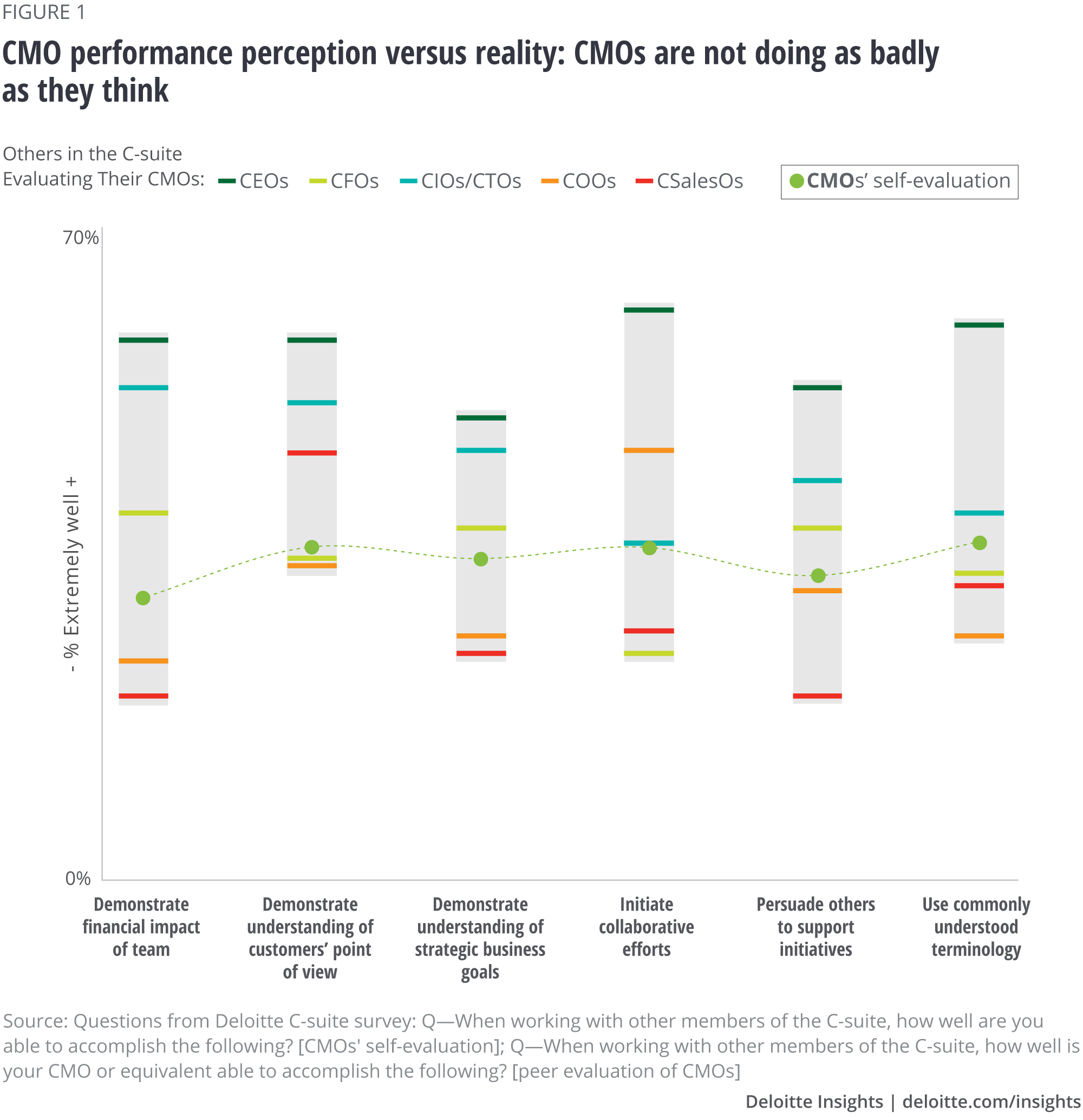
How CMOs are enhancing the stature of marketing
With the CMO’s value and reputation in the C-suite and boardroom rising – according to studies by McKinsey, IBM, Forrester, Deloitte and others – what strategies can CMOs employ to maintain (or improve) their standing?
In this 3rd and final article in our series on CMOs, we talked to seven professionals in the role to get their thoughts on what CMOs should and shouldn’t be doing.
What do CEOs think?
A recent study published by Deloitte1 offered this welcome news for the always embattled CMO. Other members of the C-suite, particularly the CEO, gave CMOs a much higher performance rating than CMOs gave themselves.

Our panel
We recently spoke with several long-time CMOs, in separate interviews, to get their perspective on this topic.
- Liz Bigham, CMO of Burford Capital
- Rishi Dave, CMO of Vonage
- Chris Goodman, until recently the CMO for KPMG
- Phil Grabfield, marketing lead at E&I
- Gary Conway, Chief Evangelist and former CMO of Automation Anywhere
- “Kristen,” CMO of an e-commerce company
- “Ken,” head of the DTC business (online and offline) for an appliance manufacturer
Q
P/M: From the perspective of the CEO, what can a strategic marketer do for their business? What should be at the top of the CMO agenda?
A
Liz: Excellent question. A CEO looks for a CMO who can tell them things they don’t know about customers they have, who can help them acquire customers they’ve identified, or even those they haven’t yet identified. There is a temptation for CEOs to be steeped in the business at hand and be a bit more competitor-focused. The CMO can be strategic by being rigorously focused on customers. As much as they may spend time with customers and think they know them, CEOs may gloss over nuances that are actually driving client decisions. I think a good strategic CMO will help the CEO see things in a new way. Some of this will come through data, some will come by taking a step back and looking at the customer experience and asking what aspects of this experience could be better.
Gary: It starts with positioning well. By positioning I mean creating several points of differentiation in the psyches of your target audience that compels them to want to know more about YOUR product and less about your competitors. The best positioning tends to be so commanding and differentiated that it has a high propensity of actually de-positioning competitors. Then your obligation is to create and drive marketing programs to get precisely the right message to precisely the right person, through the right channel. at the right time. You must have the right teams, organized properly, that understand these dynamics and have the experience to execute.
Rishi: Number one: how are you going to drive differentiation for your company and on what basis? That’s the hardest thing to answer and hardest thing to drive. How is the company winning now and how is it going to win? Is it your product or the customer experience you’re driving? Are you the low-cost provider? Very quickly assessing why are you winning today and what more the company could be doing to differentiate.
Ken: In really large, established companies, it’s easy for marketing to become very fragmented. During periods of business transformation, the CMO can play a very important role in setting the vision and agenda, in a highly centralized fashion. In growth-oriented companies, the CMO can have a big impact on business performance through experience design, being a champion of the consumer. In these companies, CMOs can own the P&L or share P&L responsibility with a Chief Commercial Officer. CMOs should be concerned about new business models. Lots of people are thinking about new products, but not as many about new models. For example, in our business, I’d like to put one of our products in every room of your house, and you’d probably like to have one. But it’s unlikely that I’m going to be able to sell you a half dozen of these appliances. Realizing the opportunity here might come through a new business model.
Q
P/M: What can enhance a CMO’s reputation?
A
Kristen: Owning business results. Showing that you are successful in driving results enhances the CMO’s reputation. It’s also the talent you bring into marketing that can elevate the overall function and organization. Our analytical group recruits directly from consulting, because they can do any function – they choose to do marketing. In the financial services firm I worked in, they tended to hire specialists. Generalists may be more effective in tying marketing results to business results than specialists because they may be able to see the broader business picture.
Phil: Filling the pipeline with a lot more leads for our business partners. Prior to my arrival, the Cooperative was providing our suppliers with less than 25% of their leads. Most were coming from our business partners (suppliers) themselves. Which begged the question, if I can create these business opportunities myself, how is E&I providing value? We’ve done this by creating content that our members are interested in – success stories, videos, infographics, etc. And we introduced a marketing automation platform, Marketo, which helps us to nurture these leads and help sales determine which accounts to focus on. It’s all about the quality of leads, not the quantity.
Liz: Taking a step back, asking fundamental questions, and revealing new truths about our business, our customer, our potential customers to other C-Suite members can definitely enhance your reputation. CMOs should be focused on growth, but there are different flavors of growth. There’s big macro growth – markets we could be operating in, but we’re not. Understanding that is incredibly important. And micro growth. For the people we’re already working with, how do we teach them new things – that can be a real engine of opportunity.
Q
P/M: What can diminish a CMO’s reputation?
A
Liz: Not having the data – not having thought to get the data – is a definite diminisher.
Ken: CMOs somehow, because they’re really good at communicating, and have good people skills, tend to become the glue in the C-suite. This can put them in a position of spending a lot of their time on internal versus external activities. That can diminish the stature of the CMO if the role becomes viewed as more of a coordination function versus a strategic growth driver.
Q
P/M: What advice would you give to a new CMO?
A
Chris: Start by immersing yourself in the business strategy of the firm and spending a lot of time with the executive team and the business leaders. Those relationships and strategy are key. You also need a shared view of the value of marketing for the job you’re accepting. If you think you’re going in to define the customer experience and the brand purpose, and they think of you as the events guy, that’s not going to be a recipe for success.
Liz: CMOs have a notoriously short tenure, so there is a tendency to think you have to solve all the problems immediately. But I believe there is huge value in taking your time and not presuming you know the answers, the clients, the business, before acting. I’d also advise hiring really fantastic people who reflect well on you. Having always been a marketer in a professional services or financial services setting, I’m keenly aware of the need to hire people who are credible in the business and who don’t play into negative stereotypes of marketing as in any way apart from the business.
Rishi: The number one thing is to build relationships with other members of the C-suite. That’s a very critical thing for the CMO, and one of the first things the CMO should focus on. Collaboration is key, so this sets up the CMO to be in a position to collaborate. Even before going into the role, understand the function of marketing within the company. This tells you what you need to focus on. In your first 90 days, build a clear plan and a clear set of priorities. Get some early wins – not necessarily getting things out the door but showing strong progress in what you’re doing. Finally, get your team and its structure solid very quickly. In the first 90 days, assess your org and team related to your strategy and what you want to do and make those changes very quickly.
If you missed Part 1 or Part 2 in our three-part CMO series, read them now for more great insights into the CMO experience.
1 Deloitte, The makings of a more confident CMO, September 2019



 See what they have to say
See what they have to say